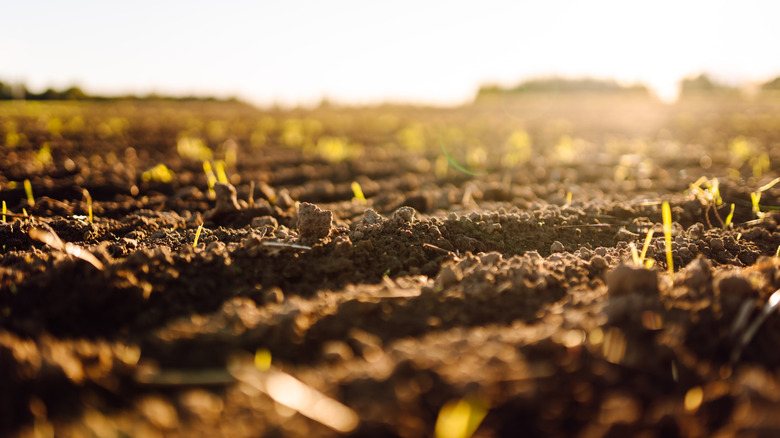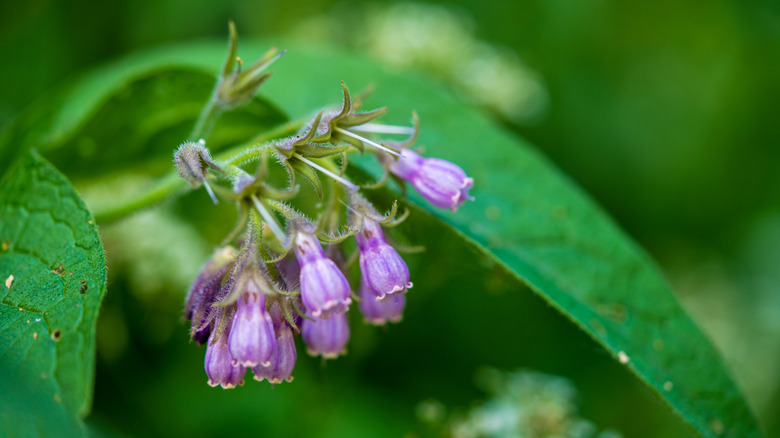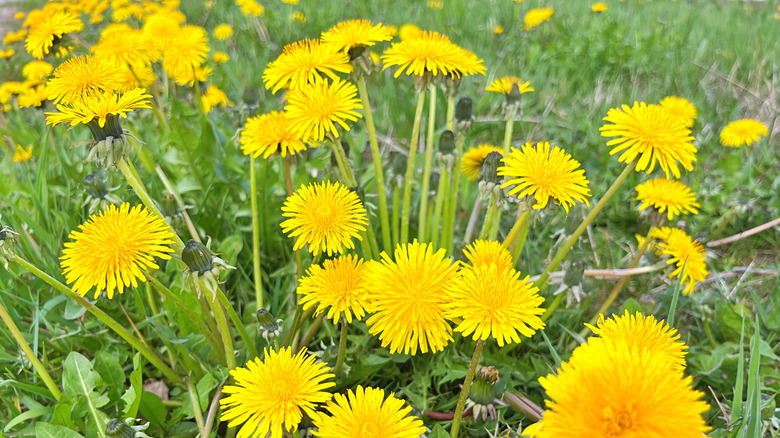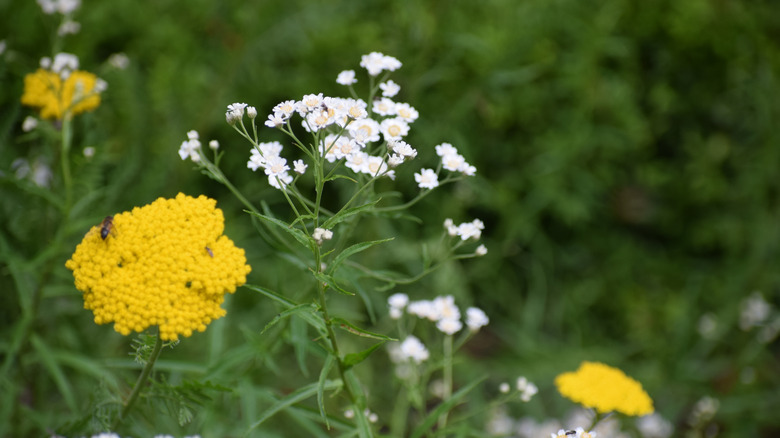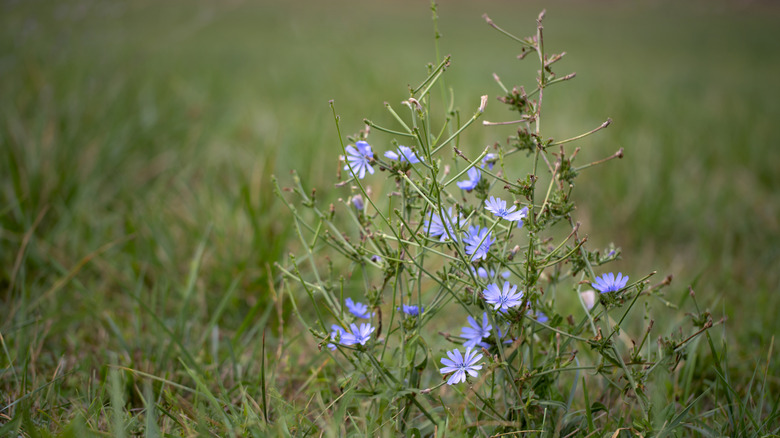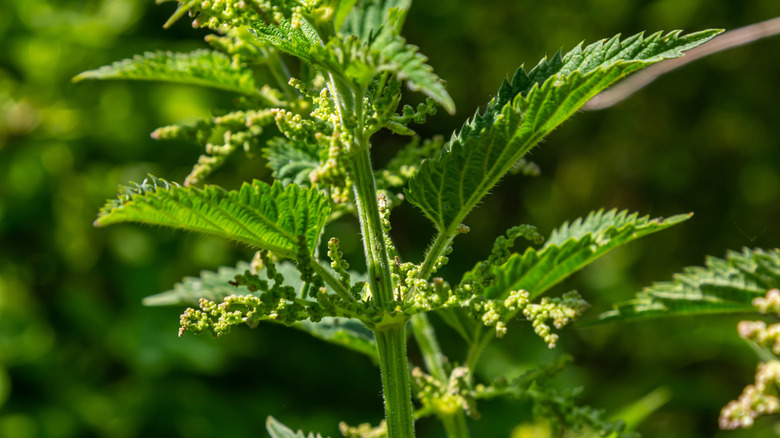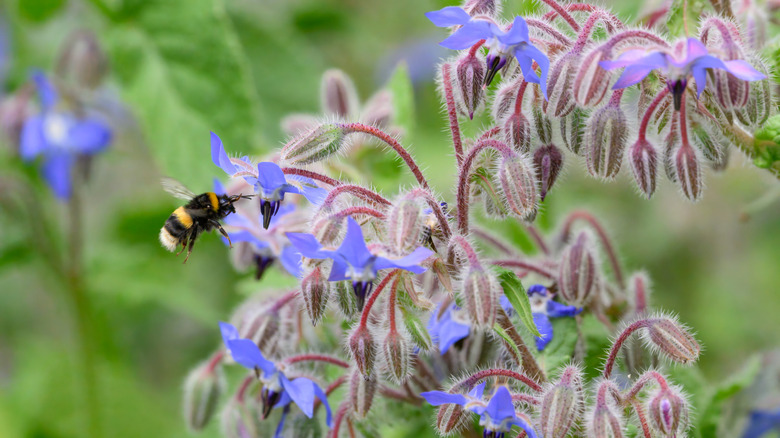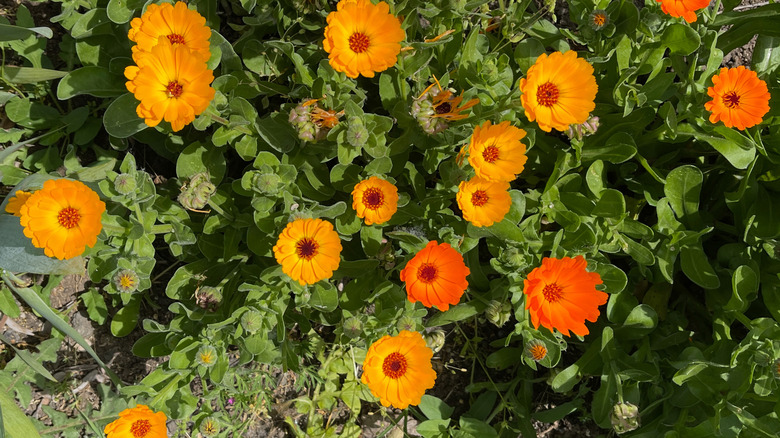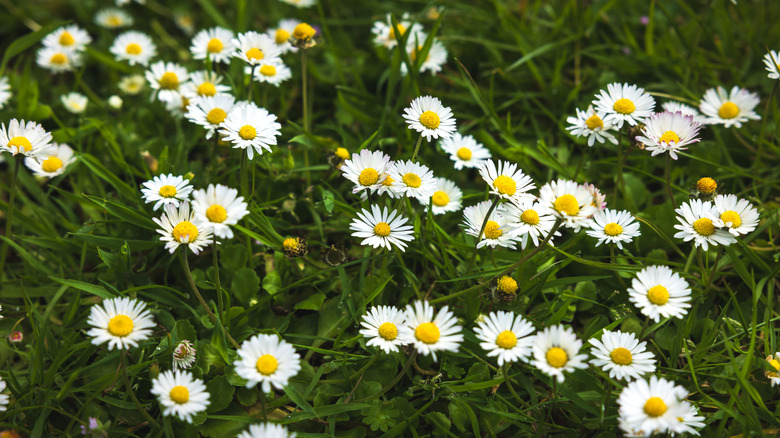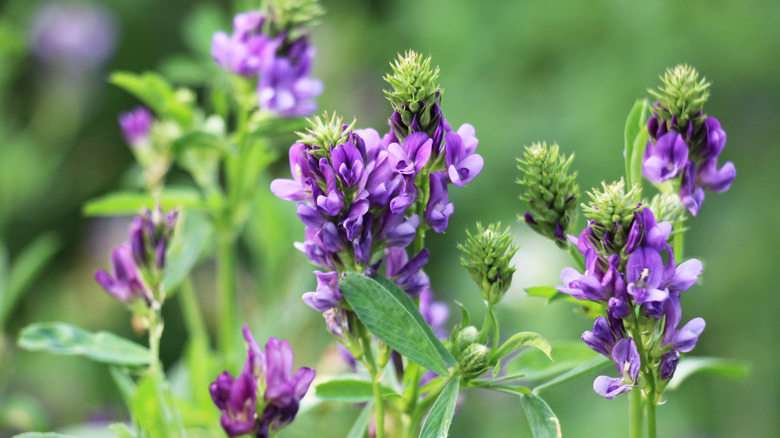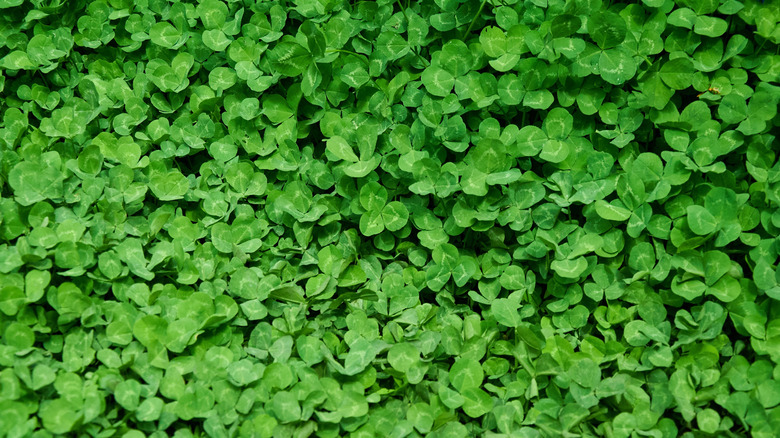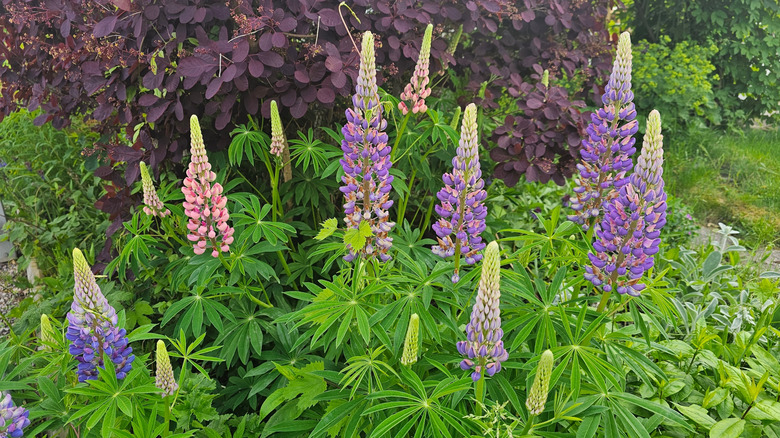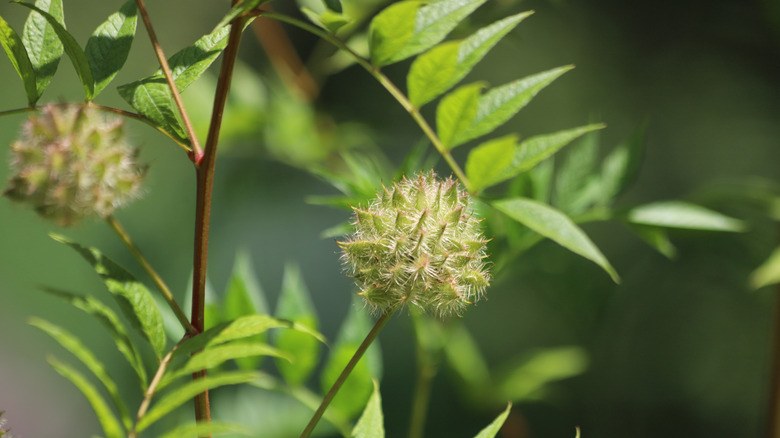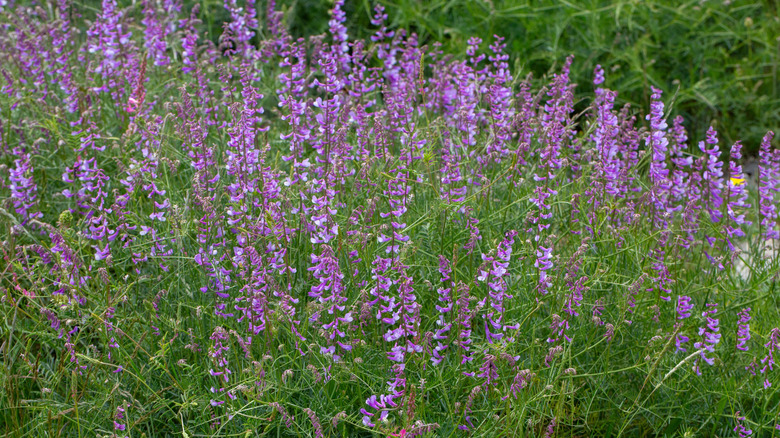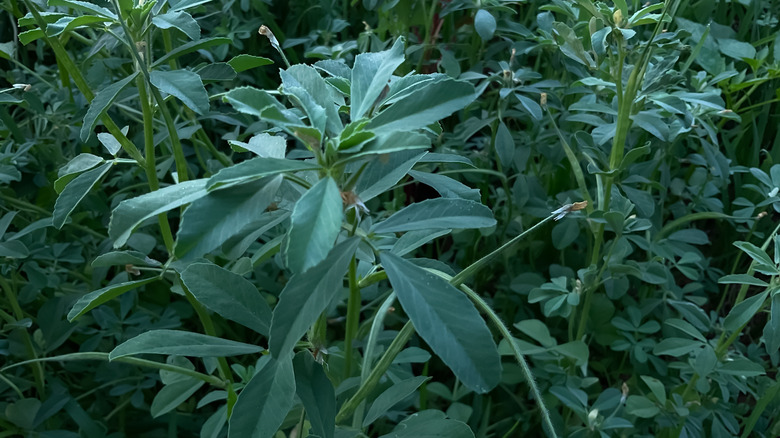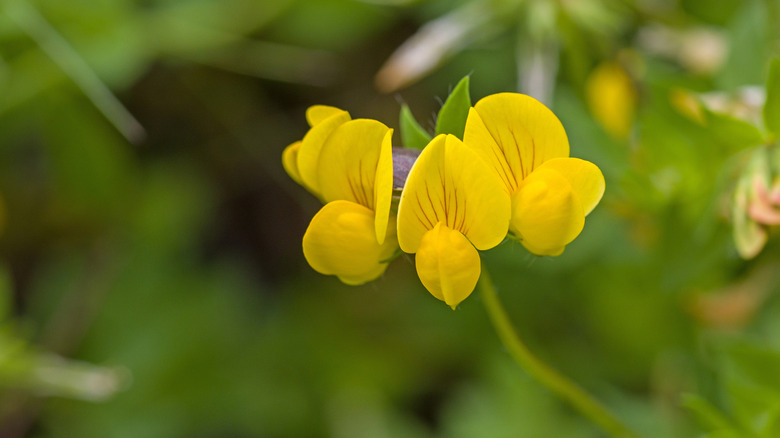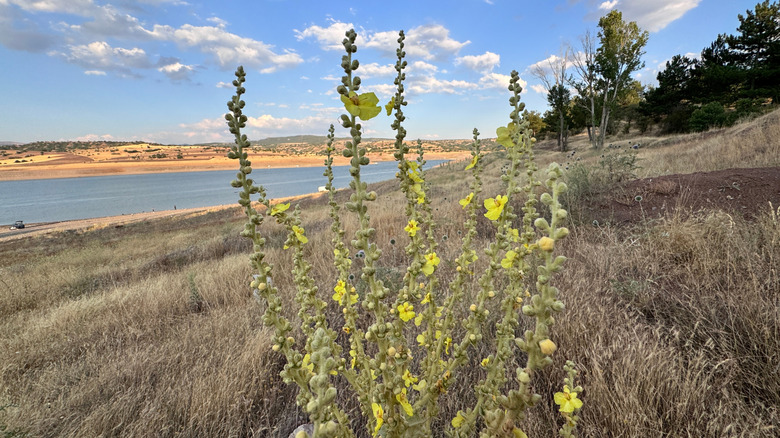16 Herbs You Should Plant In Your Garden To Naturally Enrich The Soil
If you think herbs are only good for spicing up your dinner, think again. There are tons of herbs that can do a lot more than just add flavor to a meal, like helping your entire garden thrive by enriching the soil. Whether you're a seasoned gardener or just getting started, planting the right herbs can be an easy way to naturally boost soil health by filling it with nutrients like magnesium, potassium, and iron. Herbs can also do wonders at fixing nitrogen from the air into the ground, which is essential for plants to grow.
You might know that there are tons of plants that you should have in your garden to naturally enrich the soil, but among them are some interesting herbs you might not have considered before. For example, herbs like comfrey, stinging nettle, or borage can be used as mulch to enrich the soil as they decompose after storing tons of nutrients in their leaves, roots, and stems. Others, like alfalfa, clover, or lupine, are able to grab nitrogen from the air and store it in nodules in their roots. As they grow, these herbs release nitrogen from their nodules into the ground, which benefits other plants around them, including the ones that were not gifted with such nitrogen-fixing abilities. Without the help of some of such plants, you'll likely have to resort to artificial fertilizers.
While some of these herbs are edible, it's important to use caution before consuming anything from the garden. The tradition of herbal medicine goes back centuries, but some of these practices are now frowned upon by medical professionals. When used incorrectly, medicinal herbs can be dangerous, so before you make a tea out of fresh garden leaves, make sure to check credible medicinal sources or check in with a doctor.
Comfrey
Comfrey (Symphytum officinale) is a plant that has large green leaves and clusters of purple flowers. It's a common medicinal herb, though doctors don't recommend using it. Instead, plant comfrey for its ability to improve soil health. Its roots are thick and can loosen soil so that water can reach deeper and the roots of other plants can get more air. It's especially great for a garden if you let dying comfrey plants (roots and leaves) decompose. Over time, dead comfrey plants will become mulch and release tons of potassium, iron, nitrogen, and magnesium into the ground.
Dandelions
You might know the dandelion (Taraxacum officinale) as a weed, but it's actually also an herb. While you might be trying to kill dandelions for effective weed control, it's important to note that the dandelion is actually able to enrich the soil and improve its quality. Their roots attract calcium, potassium, and iron and bring them to the upper layers of the ground. Once a dandelion dies, its leaves and roots decay and these nutrients return to the ground, enriching it for other plants in your garden.
Yarrow
Yarrow (Achillea millefolium) is an herb that's native to North America and a wonderful choice for beginners because it's so low-maintenance, aesthetically pleasing, and good for soil health. With its long green stems and clusters of bright flowers, it can grow in USDA Hardiness Zones 3 though 9 across the United States. Its roots pull nutrients from the soil like magnesium, calcium, copper, phosphorus, and potassium, making the area where it grows more nutritious and healthy.
Chicory
Chicory (Cichorium intybus) is an herb that's often used in traditional medicine against constipation or indigestion. Its roots can grow into the deeper layer of the soil, nearly nine feet below the ground. In doing so, chicory's roots are great at breaking up compacted ground and aerating it for better soil health. In addition, chicory's roots pull phosphorus and potassium from deeper layers of the ground with its roots, which makes your garden healthier.
Stinging nettle
Stinging nettle (Urtica dioica) is an herb that's also used in traditional medicine to help patients suffering from diabetes. However, it's also great at accumulating iron, potassium, and calcium. These nutrients can go back into the ground once the plant dies, as long as you leave it to decompose on the ground, using it as mulch. While these guys are commonly thought of as weeds, they're actually wonderful for ecosystems, whether it's improving soil health, attracting butterflies, or bringing in birds that eat their seeds.
Borage
Borage (Borago officinalis), which you might also know as starflower, is an herb that produces unique little purple flowers. You can eat the leaves of borage, or even use their flowers as cocktail garnishes. What's more, borage is wonderful for soil health. It's best to cut borage plants before they flower and let them decay on top of the soil. This will act as a rich mulch and return tons of nutrients contained in borage, like nitrogen and potassium, into the soil, which will help enrich it.
Calendula
Calendula (Calendula officinalis) is an herb known for its bright orange blooms. Once dried, these petals are often used for their anti-inflammatory and antimicrobial properties in herbal medicine. It also benefits the garden, where it's been shown to partner up with fungi to remove contaminants from the soil. It has been studied for its ability to help clean up soils contaminated with cadmium, a carcinogenic metal that can pollute soils due to mining or other industrial activities.
Chamomile
Chamomile (Matricaria chamomilla) is a soothing herb you should plant to naturally improve your garden's soil. It's a medicinal herb from the daisy family, which looks very similar to one with its white petals and a bright yellow core. It's known for helping against anxiety, but it's also a wonderful plant to have in the garden. Chamomile is naturally anti-fungal and anti-bacterial, which means it can help nearby plants against different types of mold and mildew.
Alfalfa
Alfalfa (Medicago sativa), which you might know as lucerne, is an herb with long green stalks and bright purple flowers. It's only consumed by humans as sprouted seeds or in dietary supplements, but its leaves and stalks can be used to feed animals like horses, for example. Nonetheless, alfalfa is a great addition to the garden because it's one of the best plants for fixing nitrogen into the ground. It also contains other nutrients like potassium, magnesium, iron, and phosphorus. This makes it a wonderful choice if your garden soil is lacking in nitrogen.
Clovers
Clovers (Trifolium repens) might be famous for bringing luck (well, if you can find a four-leafed one), but their magic is real in the garden. These humble little herbs, with their edible flowers, can fix nitrogen into the soil. This gives other plants a natural boost without having to buy a chemical fertilizer. It's a wonderful companion plant, especially because it's also beloved by pollinators and can grow quickly and easily.
Lupine
Lupine (Lupinus spp.) is a stunning herb that grows large, vertical clusters of flowers. These clusters are often known in their white-to-purple gradient color, but there are tons of lupine species, including some in colors like pink, yellow, or white. They're absolute beauties, but that's not all — they're also wonderful at adding nitrogen into the soil. Planting lupine in your garden is a fantastic and all-natural way to fix some of the nitrogen from the surrounding air so that it can be used by neighboring plants.
Licorice
You probably know licorice (Glycyrrhiza glabra) as a candy or herbal tea flavor. But beyond its sweet edible reputation, this herb is also a wonderful way to make your garden soil healthier and increase its nitrogen levels. Licorice takes nitrogen from the air around it and stores it in its roots, which naturally enriches the soil and supports the health of nearby plants. While it's sweet, licorice is also a surprisingly mighty addition to the garden.
Vetch
Vetch (Vicia sativa) is not the flashiest plant, but it's a hard-working one when it comes to nitrogen. This herb has long stalks and skinny leaves, ornamented by small, delicate purple blooms in the spring and summer. Vetch is a wonderful choice, especially because it can enrich the soil very quickly when used as a mulch. Once a vetch plant is cut and starts to decompose, it releases nitrogen within just a few weeks.
Fenugreek
Fenugreek (Trigonella foenum-graecum) is an edible herb that comes from the Mediterranean region. It's used in Indian cuisine and its distinct flavor and smell (reminiscent of maple syrup) have even led some companies to use it as a flavoring additive in foods or drinks. Fenugreek is an herb you should consider growing in your garden for healthy soil because it does a wonderful job fixing nitrogen into the ground, helping to ensure the plants you later cultivate have what they need to grow tall and strong.
Bird's foot trefoil
Bird's foot trefoil (Lotus corniculatus) sounds straight out of a children's book, but it's a real herb that produces pretty yellow flowers come springtime. It grows in temperate climates and looks wonderful in wild or cottage-style gardens. It's an easy-going plant that can resist small droughts and mild winters. It's a great herb to use to enrich your garden's soil because it captures nitrogen from the air and stores it in its roots, which can help other plants nearby.
Mullein
Mullein (Verbascum thapsus) is an interesting herb that blooms on a biennial cycle. It's a large plant that grows in a cone shape and can reach heights of up to 10 feet tall. They're often spotted in the wild, bordering roads and highways with their large, hairy leaves and small yellow flowers. While it's a bit of a wild choice for a garden, muellin can help other plants thrive thanks to its roots. These can aerate the ground, and they can attract nutrients from deeper layers, overall making the area healthier and better for cultivation.
